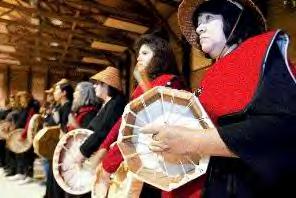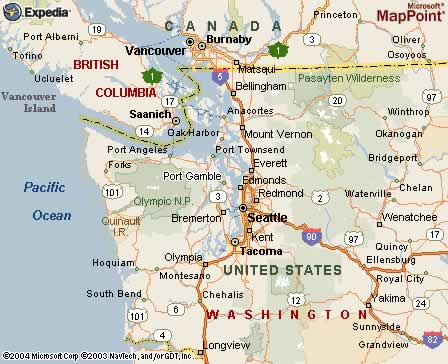|
|
Canku Ota |
|
|
(Many Paths) |
||
|
An Online Newsletter Celebrating Native America |
||
|
November 1, 2003 - Issue 99 |
||
|
|
||
|
'Bring Our Songs Out' |
||
|
by Rachel Pritchett Sun
Staff
|
||
|
credits: Trudy
Marcellay of the Chehalis tribe played the drum Saturday with members
of other tribes at the Port Gamble S'Klallum Night of Song. photo
by Carolyn J. Yaschur
|
|
"Port
Gamble Whale Song" Listen, I hear my mother Listen, I hear my father Listen, I hear my grandparent Listen, what's that? It's the Port Gamble killer whale returning -- Duane Pasco, 1990
They had come to witness a historic moment as the tribe "brought out" its songs and accepted two long-lost canoe paddles. After an enormous feast of salmon, venison and crab, the mood became somber as the sacred ceremony began. Many dressed in traditional regalia of woven cedar vests, feathered hats and red button shawls and listened as Tribal Elder Oliver Jones and a large circle of drum-beating singers summoned ancestors in song. Jones apologized to the ancestors for not preserving the ancient songs of the oral-tradition society when potlatches were outlawed. "And now they are coming home," he said. In the 1800s, S'Klallam canoe paddlers visiting the northernmost tribes of British Columbia and Alaska during potlatches sang songs to their hosts. In the 1900s, when potlatches were outlawed, the northern tribes hung on to parts of the songs. Growing up in Alaska, S'Klallam friend Duane Pasco of North Kitsap remembered some of them from his childhood and has written a collection of songs for the S'Klallams, who officially performed them Saturday. "So they're grabbing bits and pieces, trying to reconstruct," Pasco said. "This is a revival." Four honored "witnesses" sat in special chairs during the ceremony, making sure the songs were performed in the right manner and remembering them for future generations. They included Guy Capoeman of the Quinaults, Connie McCloud of the Puyallups, Lester Green of Neah Bay and Edgar Charlie of the Ahousaht nation of British Columbia. The songs are written in S'Klallam language and in Chinook jargon, a universal language once used by Indians, traders and missionaries. Some simple, some complex, the songs became the property of a person or family. They were about trips made by the paddlers, killer whales (metaphors for the S'Klallam canoes), life and, or course, love. After Tribal Chairman Ron Charles welcomed the crowd, he announced, "Bring our songs out." Then began the evening of singing, drumming and dancing. A sea of red and black undulated across the tribal center as women dancers led by Francine Swift performed the traditional paddle dances. Several at a time wielded paddles as they rhythmically made their way across the floor. Men took up song, beating the drums louder and louder until they suddenly stopped. Prayers in the native language and in English were said. In one of the most stirring moments of the evening, Puyallup tribe member Raymond McCloud Sr. and his wheelchair-bound mother, Edith McCloud, presented the S'Klallams with two very old paddles, the only ones that old known to the tribe. No one knows for certain yet how old the small, pointed paddles are. They were found in 1959 in a shed on the reservation by Robert Brown of Tacoma and his father, Bill, as they were logging. They took the paddles home and forgot about them for decades until 1991, when Robert Brown rediscovered them. He contacted the nearby Puyallup tribe, who presented the paddles to the S'Klallams Saturday night. Tribal members hope to learn much from the original paddles, such as the material they were made of, their size and dimension. Brown attended the ceremony. Accepting the paddles swathed in rich, red material and tied with cedar boughs were Ron Charles and Tribal Elder Jake Jones. A tiny bell rang as the hushed crowd watched. Tribal elders held up the paddles for all to see, then women dancing to celebratory songs carried the paddles throughout the crowd. The S'Klallams' renewed song effort began in 1989, when the tribe launched its 35-foot canoe Klumachun for a paddle to Seattle during the Washington centennial. Many paddles have take place since then, and according to paddler Mary Jones, the next, to British Columbia, is slated for next summer. The need for songs has further grown as the tribal paddlers received more invitations to sing at other events. Each of the 19 canoe nations who visited Saturday received a traditional in-person invitation from Tribal Elder George Jones, according to Mary Jones. Song witness Capoeman explained, "When someone comes to you somewhere, you have to go there and help them any way you can." Honored guests were given blankets, rare and historic cobalt blue trading beads, new paddles painted in the traditional red and black of the Little Boston tribe and S'Klallam baskets filled with fish and jam. The Port Gamble S'Klallam Tribe has about 300 enrolled members, according to Mary Jones. Construction of a longhouse is expected in a few days. As for the future of the S'Klallam songs, Mary Jones will be teaching some of them to students at Wolfle Elementary School in Kingston in November, Native American Awareness Month. On Thursday last week, Jake Jones sat at a stool carving in a shed near the tribal center as he listened to the S'Klallam songs on tape. "It's something that's going to make a difference in our community," he said. |
|
|
www.expedia.com |
|
|
||
|
|
||
| Canku Ota is a free Newsletter celebrating Native America, its traditions and accomplishments . We do not provide subscriber or visitor names to anyone. Some articles presented in Canku Ota may contain copyright material. We have received appropriate permissions for republishing any articles. Material appearing here is distributed without profit or monetary gain to those who have expressed an interest. This is in accordance with Title 17 U.S.C. Section 107. | ||
|
Canku Ota is a copyright © 2000, 2001, 2002, 2003 of Vicki Lockard and Paul Barry. |
||
 |
 |
|
|
The "Canku Ota - A Newsletter Celebrating Native America" web site and its design is the |
||
|
Copyright © 1999, 2000, 2001, 2002, 2003 of Paul C. Barry. |
||
|
All Rights Reserved. |
||
 It
was like a giant family reunion Saturday night when about 400 Native
Americans from 19 canoe nations from Canada to Oregon converged
on the Port Gamble S'Klallam Tribal Center.
It
was like a giant family reunion Saturday night when about 400 Native
Americans from 19 canoe nations from Canada to Oregon converged
on the Port Gamble S'Klallam Tribal Center.